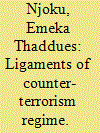| Srl | Item |
| 1 |
ID:
168225


|
|
|
|
|
| Summary/Abstract |
There is a dearth of studies on indirect victims of sexual violence in counter-terrorism efforts. Using Nigeria as a case study, this paper argues that global and state-level counter-terrorism policies have generally failed to account for the psychological effects of the engagement of female NGO workers in counter-terrorism operations or mitigating the effects of terrorism in conflict zones. Specifically, there has been an increase in sexual violence perpetrated by some members of the security agencies involved in counter-terrorism operations in North-eastern Nigeria. As a result, female NGO workers carry out Medicare, psychosocial counselling and advocacy for these victims. Female NGO workers become exposed to the trauma of victims of sexual violence, which affects their mental health and thus performances in counter-terrorism activities in the country. This altered their worldview on issues of safety even among secured locations or among the presence of security agents and reinforced feelings of powerlessness.
|
|
|
|
|
|
|
|
|
|
|
|
|
|
|
|
| 2 |
ID:
185567


|
|
|
|
|
| Summary/Abstract |
While there is a growing interest in conflict-related sexual violence (CRSV) against men, conceptual understanding and empirical knowledge are still inadequate. The notion of spiritual security is introduced in this article as an explanatory variable in CRSV, using survivors' discursive views of sexual violence victimizations in Nigeria's north-eastern region. The CRSV of males, it is argued, may also be understood as a ritual or spiritual activity carried out for bodily protection, financial prosperity, or socio-political ascendency. The survivors' impressions of CRSV's spiritual undertones are not unrelated to the heteronormative and collectively homophobic culture in their society, in which violent same-sex relations are considered so perverse and meaningful only if they are conceived as ‘evil or devilish practices’. Spiritual beliefs and practices, on the other hand, determine much of the social reality of many people in various parts of the world, and they are regarded as potent on security issues ranging from physical protection to wealth creation and socio-political advancement. This study adds to the continuing discussion on the reasons behind CRSV against men.
|
|
|
|
|
|
|
|
|
|
|
|
|
|
|
|
| 3 |
ID:
178673


|
|
|
|
|
| Summary/Abstract |
This article examines the sociopolitical factors that influenced the framing of counterterrorism measures (CTMs) in Nigeria. It argues that the government strategically excluded civil society organizations CSOs from participating in the process of formulating CTMs. Thus, this situation renders CSOs without agency in the making of CTMs and their legal capacity to advocate for the marginalized and vulnerable groups in the context of counterterrorism in Nigeria. Additionally, the employed strategic exclusion of CSOs aided in the construction of a service delivery role that restrained political advocacy. Furthermore, the study argues that, despite the government counterterrorism approach, CSOs did not seek public support on the need to contest CTMs in Nigeria and have complied with these laws and policies. The empirical analysis is based on mixed-method research of CSOs and government agents. This research seeks to contribute to the debate regarding the effects of CTMs on CSOs by tracing the establishment of service delivery roles for CSOs to these organisations strategic exclusion in the formulation of CTMs.
|
|
|
|
|
|
|
|
|
|
|
|
|
|
|
|